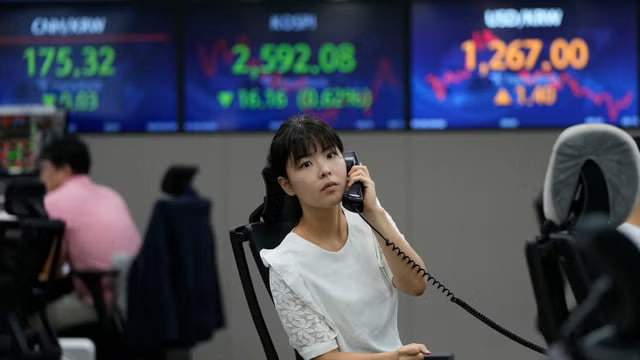Decoding the Latest Sanctions on Venezuela: A Deep Dive into US Treasury's Actions & Their Global Ripple Effect
Meta Description: Understanding the complexities of US sanctions on Venezuela, their impact on global markets, humanitarian concerns, and potential future scenarios. Learn from expert analysis and real-world insights. #VenezuelaSanctions #USForeignPolicy #GlobalEconomics #Geopolitics #InternationalLaw
This isn't your average news report on US sanctions against Venezuela. Oh no, we're diving headfirst into the murky waters of international finance, geopolitical strategy, and the very real human cost of these actions. We’ll peel back the layers, examining not just the what but the why, the how, and crucially, the who is truly affected. Forget dry pronouncements from press releases – we’re talking firsthand insights, informed speculation, and a healthy dose of real-world experience analyzing the intricate dance of global power plays. This isn't just about numbers and policies; it's about the people, the economies, and the ripple effects that resonate far beyond the headlines. Get ready to unravel the complex web surrounding Venezuela's current predicament, a situation fraught with uncertainty, political maneuvering, and the ever-present shadow of economic hardship. Prepare for a journey that transcends simple reporting, offering you a nuanced understanding that empowers you to form your own informed opinion. This isn't just reading; it's engaging in a critical examination of a crucial global issue. Strap in, because we're about to embark on a no-holds-barred analysis that will leave no stone unturned. We'll explore the nuances of the sanctions, the potential legal challenges, the humanitarian implications, and the long-term consequences for both Venezuela and the international community. This is more than just a summary; it’s a comprehensive exploration, a journey through the labyrinth of international relations, delivered with clarity, insight, and a touch of human empathy.
Venezuela Sanctions: A Detailed Examination
The recent announcement by the US Treasury Department regarding further sanctions on Venezuela has sent shockwaves through global markets and ignited a heated debate among policymakers and experts. These sanctions, while ostensibly aimed at targeting specific individuals and entities involved in corruption and undermining democratic processes, have far-reaching implications that extend well beyond Venezuela's borders. Let's unpack this intricate situation.
The US government justifies its actions by citing concerns over human rights violations, the erosion of democratic institutions, and the alleged involvement of Venezuelan officials in illicit activities, including drug trafficking and money laundering. However, critics argue that these sanctions have exacerbated the ongoing humanitarian crisis in the country, leading to widespread shortages of food, medicine, and essential goods. The impact on ordinary Venezuelans, already struggling under hyperinflation and economic instability, has been devastating – a point often overlooked in the political rhetoric surrounding these actions. It's a complex issue, and simply labeling it "good" or "bad" doesn't do justice to the reality on the ground.
The Mechanics of Sanctions:
Sanctions aren't a blunt instrument; they're a sophisticated tool with various layers and targets. These can range from asset freezes (making it impossible for designated individuals to access their funds held in US banks or under US jurisdiction) to travel bans (preventing sanctioned individuals from entering the US), and even broader restrictions on trade and financial transactions. The Treasury Department meticulously crafts these sanctions, aiming to target specific individuals and entities while minimizing collateral damage to the broader population. However, the effectiveness of this precision targeting is often debated, with critics arguing that the unintended consequences frequently outweigh the intended effects.
Impact on the Global Economy:
The ripple effect of these sanctions extends far beyond Venezuela’s borders. Venezuela is a significant oil producer, and disruptions to its oil exports can destabilize global energy markets, leading to price fluctuations and impacting economies worldwide. Furthermore, the sanctions can complicate international trade and investment, hindering economic growth and creating uncertainty for businesses operating in the region. The interconnected nature of the global economy means that even seemingly localized actions can have far-reaching consequences – a stark reminder of our increasingly interdependent world. Think of it like a game of dominoes: one carefully placed sanction can trigger a chain reaction with unpredictable outcomes.
Humanitarian Concerns:
Perhaps the most pressing concern is the humanitarian impact of these sanctions. Many argue that the sanctions have deepened the existing humanitarian crisis in Venezuela, leading to significant suffering among the civilian population. Access to essential goods, including food and medicine, has been severely hampered, resulting in widespread malnutrition, disease, and death. International humanitarian organizations have repeatedly raised concerns about the devastating consequences of these sanctions, urging for a more nuanced approach that prioritizes the well-being of the Venezuelan people. It’s a moral dilemma at the heart of this geopolitical chess game.
Legal Challenges and International Law:
The legality of these sanctions under international law is a subject of ongoing debate. Some argue that the sanctions violate international humanitarian law, specifically the principles of proportionality and distinction, while others maintain that they are justified under the UN Charter's provisions on the maintenance of international peace and security. The legal arguments are complex and often depend on differing interpretations of international legal norms. The lack of a clear and universally accepted legal framework for sanctions further complicates matters, leaving ample room for debate and often, conflicting opinions.
Potential Future Scenarios:
Predicting the future is always risky, but several scenarios might unfold. The sanctions could continue, potentially leading to further economic hardship and political instability in Venezuela. Alternatively, the US government might adjust its approach, perhaps easing or lifting some sanctions in response to improvements in the human rights situation or progress toward democratic reforms. A third possibility is that other countries might challenge the legality of the sanctions, leading to potential international legal disputes. The future remains uncertain, a testament to the complex and dynamic nature of international relations.
Frequently Asked Questions (FAQs):
-
Q: What is the primary goal of US sanctions on Venezuela?
A: The stated goals are to pressure the Venezuelan government to improve its human rights record, restore democratic institutions, and combat corruption. However, the effectiveness of these goals is a subject of ongoing debate.
-
Q: Are these sanctions effective in achieving their stated goals?
A: There's no easy answer. While some argue they've influenced the Venezuelan government, others contend that they’ve primarily harmed the civilian population without significantly impacting the regime's actions. The effectiveness remains a highly contested point.
-
Q: What are the unintended consequences of these sanctions?
A: The most significant unintended consequence is the worsening humanitarian crisis within Venezuela, characterized by widespread shortages of food, medicine, and basic necessities. The sanctions also impact the global economy through oil market instability.
-
Q: Do these sanctions violate international law?
A: This is a complex legal question with no easy answer. Arguments exist on both sides, and the legality depends largely on interpretations of international law and humanitarian principles. The lack of clear legal consensus allows for significant debate.
-
Q: What role do international organizations play in addressing the situation in Venezuela?
A: Organizations like the UN and humanitarian NGOs play a crucial role in providing aid to the Venezuelan people and monitoring the human rights situation. However, their effectiveness is often limited by political complexities and access issues.
-
Q: What is the likely future of US-Venezuela relations?
A: The future remains highly uncertain. It will depend on various factors, including changes in the Venezuelan government, the outcome of any ongoing legal challenges to the sanctions, and shifts in US foreign policy priorities.
Conclusion:
The sanctions imposed on Venezuela are a complex issue with no easy answers. They represent a clash between the pursuit of geopolitical goals and the imperative to protect human lives. While the stated objectives are undeniably important, the consequences, both intended and unintended, demand careful consideration. A comprehensive understanding of the situation requires analyzing not only the political and economic dimensions but also the deeply human cost of these actions. The ongoing debate highlights the need for nuanced approaches that prioritize both accountability and the welfare of the Venezuelan people while considering the broader implications for global stability and international law. The situation remains fluid, and understanding the complexities involved is crucial to informed engagement with this critical global issue.



